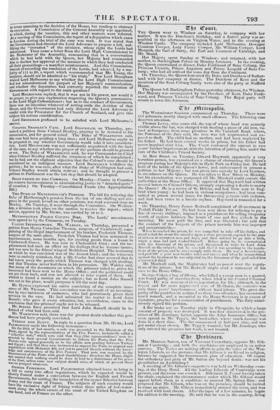Cie itlrtropolis.
The Westminster Sessions commenced on Thursday. There were 118 prisoners, mostly charged with small offences. The following case deserves attention.
Thomas Levey, nine years old, the top of whose head was scarcely visible above the bar, was charged with stealing a piece of old iron, va- lued at fourpence. from sonic premises in the Vauxhall Road, where, the Foreman of the Jury said, the iron was left unprotected and ex- posed to theft. The child had no mother, and had been neglected by his father. He had been several weeks in prison, but his father had never inquired after bins. The Court sentenced the outcast to two years' further imprisonment, with the intention of putting him under the care of the Children's Friend Society.
At Bow Street, on Tuesday, Edward Hayward, apparently a very harmless person, was examined on a charge of obstructing the Queen s progress during her Majesty's ride in Hyde Park on Friday last. He laid hold of the bridle of the Queen's horse, and endeavoured to present a petition to her Majesty ; but was given into custody by Lord Gardner, in attendance on the Queen. He was taken to Bow Street on Monday, but his examination was postponed till Mr. Minsbull could consult the authorities at the Home Office. It appeared that Hayward had written several letters to Colonel Clithero, strongly expressing a desire to marry the Queen ! He is a native of St. Helena, and had been sent to Eng- land when young : he had been in various occupations ; had been com- mitted to prison several times for threatening persons with violence, and had been twice in a Innatic asylum. Hayward is remanded for a week.
On Thursday, Henry James Rodwell complained of ill-treatment in Tothill Fields Prison. He had been sent there for refusing to pay a fine of twenty shillings, imposed as a punishment for selling twopenny worth of oysters between the hours of one and five o'clock in the morning. lie soon paid the fine, and was liberated ; but said that the conduct of the keepers of the prison towards him was improper and unwarrantable—
When he reached the prison, he was compelled to take oft' his clothes, and stand naked for Omit live minutes upon a stone pavement, exposed to the gaze of sixteen or seventeen men and boys, anti then ordered to go into a bath, where a man had just washed himself. Befoi.e going in, lie remonstrated with the Governor of the prison, and threatened to write to Lord John Russell on the subject ; but be was told that it was according to the regula- tions of the prison, and lie must comply with them. lie was a housekeeper, and paid 90/. a year rent besides rates and ; and when lie remonstrated against the treatment he was subjected to, the Governor of the gaol called him a convicted tldef.
Mr. Minshull said, the Magistrates had no power over the regula- tions of the prison ; but Mr. Rodwell might send a statement of his case to the 1-Ionic Office.
George Coker, a boy of fifteen, who killed a young man in a quarrel, was found guilty of ntanslaiOder, when tried at the Central Criminal Court. He was sentenced to transportation for life ; although, in the recent and far more aggravatel case of Medhurst, the sentence was only three years' imprisonment, without hard labour. The gross dis- parity of the punishment assigned to these two offenders, has occasioned much remark, and a memorial to the Ilome Secretary is in course of signature, praying for a commutation of punishment. The Jury unani- mously signed this petition.
A fire broke out on Tuesday night in Cheapside, by which a large amount of property was destroyed. it was first. discovered in the pre-
mises of Mr. Jennings, hatter, opposite time Atlas Insurance Office, but soon spread to Mr. 'Pegg's, the bookseller, where much damage was done in a short time. The fire commenced at half-past nine, and was got under about eleven. Mr. Tegg is insured ; but Mr. Jennings, who only entered the premises last week-, is not insured.


























 Previous page
Previous page